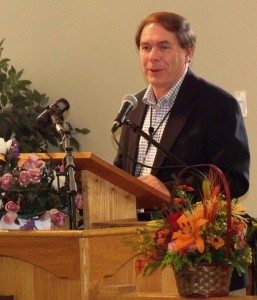Dear Brothers and Sisters in Christ,
 My grandparents immigrated to the U.S. several years before the Russian Revolution. Seeing the signs of the times, Grandpa realized it was time for a change, so they moved. Way to go Grandpa!
My grandparents immigrated to the U.S. several years before the Russian Revolution. Seeing the signs of the times, Grandpa realized it was time for a change, so they moved. Way to go Grandpa!
 Being aware and alert about what is going on around us is important. It helps us discern when and how to change, including how to participate with Jesus in the mission of God.
Being aware and alert about what is going on around us is important. It helps us discern when and how to change, including how to participate with Jesus in the mission of God.
In grandfatherly fashion, the apostle Paul wrote to his young protégé Timothy about the signs of the times. In 2 Timothy 3:1-9 he warned of “terrible times” that would occur in what he referred to as “the last days.” He said that people would be “swayed by all kinds of evil desires, always learning but never able to acknowledge the truth.”
Today, some mistakenly view “the last days” as a recent occurrence. But the Bible teaches that those days began nearly 2,000 years ago with Jesus’ ministry, death and resurrection. Peter, Paul and John all taught this (Acts 2:17, 1 Peter 1:20; 1 Corinthians 10:11; 1 John 2:18), and the author of Hebrews associated the last days with Jesus’ ministry (Hebrews 1:2). Because those last days continue today, what Paul said to Timothy about “signs of the times” applies to us as well.
In 2 Timothy 3:7, Paul refers to those who “are never able to come to a knowledge of the truth.” In striving for freedom, they refuse conversion to Christ, who is the truth. How ironic that in seeking freedom they miss out on the one way that brings true freedom. In their blindness and obstinacy, Paul says they actually oppose what is true (2 Timothy 3:8).
My grandfather used to rant about this reality—especially when watching television news commentators. He would exclaim concerning them, “That person has to go to college to develop such refined stupidity!” Obviously, my grandpa wasn’t concerned about being politically correct. His attempts at “sensitivity” were equivalent to dropping a bowling ball on your foot! He used to say, “Joey, listen to me—the world is becoming more and more stupid.”
Though I’m not sure about his conclusion, social scientists have noted in recent years that our ability to reason is becoming fragmented. This is due to the fact that much of the information we take in comes to us as disconnected, even conflicting “sound bites.” The media subject us to an onslaught of messages. As a result, our focus is fragmented. It’s not uncommon for people to cruise the Internet, watch TV and converse with someone in the room, all at the same time! We have become so steeped in this media-centric environment that our bandwidth increasingly overwhelms our brain-width! This flood of disconnected information can sway people away from what is true. In fact, much of the information promulgated by the media opposes truth.

Have you noticed that the media tend to focus on bad news? They know that bad news gets and holds our attention. Though they occasionally throw in a heart-wrenching good news story (so we don’t get completely depressed!), the proportion of bad to good news in their reports inaccurately reflects what is really going on in our neighborhoods and around the world where there is far more good news than bad.
Because bad news sells, we face a significant challenge in sharing the good news that is the gospel. To do so effectively, we must understand the signs of our times, just as Paul exhorted Timothy. We must understand who we are communicating with so that we reach our audiences “where they are.” Let me illustrate: When I grew up it was common for sermons to last 90 minutes or more. Pastors quoted multiple books and commentaries, shared the etymology of words and gave lengthy explanations. But audiences today typically are reached with shorter sermons (25 minutes is common) with stories and illustrations. It’s interesting that Jesus used this narrative approach in his day.
Adjusting the way we preach is not about pandering to our audiences—it’s about “being all things to all people,” just as Paul exhorted the church in Corinth to do (1 Corinthians 9:19-23). Preaching the gospel in ways that connect is not watering it down. After all, there is a great simplicity to the gospel, which declares the good news of God’s love and his desire for us to be in communion with him as Father, Son and Holy Spirit.
When Paul wrote to Timothy about the signs of the times, he wasn’t using scare tactics. He was reminding Timothy that there is always good news no matter the condition of the world. Jesus himself is that good news. And in spite of the bad news constantly trumpeted by the media in our day, God, in Christ, by the Spirit is at work in the world accomplishing his good work of salvation. No bad news changes that!
Living and sharing the good news with you,
Joseph Tkach
PS: Please join me in congratulating Dr. Gary Deddo on his appointment as the next President of Grace Communion Seminary (he begins serving in June) and in thanking Dr. Russell Duke for his many years of faithful service to GCS and to GCI (see the announcement linked above, left).




